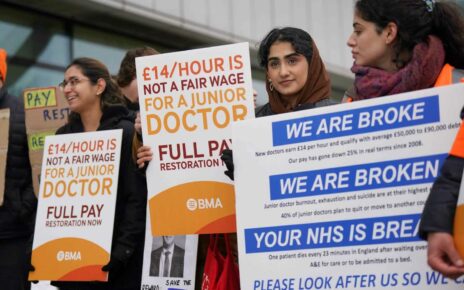The federal government has moved to gut the controversial construction industry watchdog of its powers this week in a decision sparking a fresh battle between employers and unions about worksite intimidation tactics and productivity.
Workplace Relations Minister Tony Burke had flagged the Australian Building and Construction Commission would be defunded before Labor introduced legislation to disband it, but he announced on Sunday that its remit would be reduced to the “bare legal minimum” and its most “ridiculous powers” would be scrapped altogether from Tuesday.
Members of the CFMEU construction division of the CFMMEU have been persistently targeted by the construction watchdog.Credit:Peter Braig
The commission is the most recent iteration of a building industry watchdog and was created by the Coalition government in 2016 to tackle lawlessness in the construction sector. It pursued prosecutions against the militant CFMEU construction union and other unions and enforced the building industry code.
The code covers a list of rules specific to the building industry for government-funded projects and includes right-of-entry obligations; collusion and compliance laws; limits to the display of union insignia such as flags; and restrictions on workplace agreements.
A commission spokesperson said the agency, “to date” had received no advice from Burke on the changes to the building code, “nor has it been consulted about the implications for industry”.
Employer peak body the Australian Industry Group said the decision to scrap parts of the code and disempower the commission was a “backwards step for the fight against bullying and intimidation” that would result in health and safety risks and slow the delivery of infrastructure projects such as roads, hospitals and schools.
But Sally McManus, secretary of the Australian Council of Trade Unions, celebrated the removal of the code to disempower an agency “obsessed with flags and stickers instead of skills, safety and stopping wage theft”.
In announcing the change, Burke told ABC television on Sunday that policing the code was a waste of money.
“We will no longer be spending taxpayers’ money determining what sticker someone’s allowed to put on their helmet, whether or not a safety sign has to be pulled down because it’s got a union logo in the bottom corner, or what flag might be flying at a building site,” Burke said.
“Those sorts of issues should never have been something for an official government regulator to be wasting taxpayers’ money. As of Tuesday, those offences are gone altogether.”
In a statement, he later described the watchdog as “a politicised and discredited organisation established by the previous government to target workers purely for ideological reasons”.
Workplace Relations Minister Tony Burke has stripped the ABCC of its “ridiculous” powers.Credit:Alex Ellinghausen
The commission’s spokesperson said “the regulatory framework under which the building and construction industry operates is ultimately a matter for government. The [commission] does not make the laws, it enforces the laws and will continue to do so in accordance with its statutory remit”.
“We would welcome advice from the minister on the government’s intentions in relation to the Building Code so that we can advise industry,” the spokesperson said, adding it was important the commission was able to keep providing advice under the code until the law that created the watchdog was repealed.
Labor went to the election promising to abolish the watchdog. Burke confirmed on Sunday that the government would do so this year. However, as a statutory body, its removal must be legislated, and Labor does not have a majority in the Senate to guarantee this. Even with the support of the Greens, it is likely to need the vote of a crossbench senator. ACT senator David Pocock recently raised concerns about the abolition of the commission. Other crossbenchers are yet to decide their position.
Burke said the commission’s record, mostly involving cases against the Construction, Forestry, Maritime, Mining and Energy Union “proves it has been more concerned with pursuing and punishing workers than tackling rampant wage theft and compromised safety standards”.
Opposition industrial relations spokeswoman Michaelia Cash said, “this proves once again that Labor will always capitulate to their paymasters at the CFMMEU”.
Jon Davies, head of the Australian Constructors Association, which represents construction companies, acknowledged all employers, employees and unions should be treated alike.
“While the construction industry currently has additional oversight, it is important that the pendulum not swing too far towards an unregulated environment that fails to recognise the unique and, at times, troubled history of the sector,” he said.
Last month the Federal Court delivered record fines of $840,000 against the CFMMEU and its officials after the building commission prosecuted the union for coercive behaviour across multiple Brisbane building projects, which the court said had the potential to create economic loss.
In April, the High Court backed maximum fines issued to the union for lesser offences, saying its repeated rule-breaking demonstrated it regarded lesser penalties as the “cost of doing business”.
The union’s construction division secretary, Dave Noonan, said the code prevented unions and employers from freely bargaining on apprentice ratios, quotas on employing Indigenous Australians, and enforceable gender equality measures, as well as banning workers from wearing union logo stickers on their hard hats.
“Even printed safety advice such as COVID information was banned by the draconian code, simply because the logos of the union and employer groups were on the document,” Noonan said.
Electrical Trades Union national secretary Michael Wright echoed Noonan’s sentiments, adding the winding back of the code also meant the deletion of provisions that gave employers free rein over using labour-hire arrangements for less money.
Dave Noonan, the national secretary of the CFMMEU’s construction division, has celebrated the removal of the “draconian” code.Credit:Michael Clayton-Jones
Burke said the 39 outstanding prosecutions would be transferred to the remit of the Fair Work Ombudsman, which would enforce the rules of the Fair Work Act over the building and construction industry. He said improving the safety culture of the industry would be overseen by the Federal Safety Commissioner.
An interim code would take effect from Tuesday, cut red tape and only include the elements necessary to keep the industry in check.
Master Builders Australia head Denita Wawn welcomed the transfer of outstanding cases to the ombudsman but said abolishing the construction watchdog would have “substantial negative flow-on effects”.
Critics of the watchdog “cannot simply ignore the continuous succession of Federal Court judgments documenting this reality,” Wawn said.
Cut through the noise of federal politics with news, views and expert analysis from Jacqueline Maley. Subscribers can sign up to our weekly Inside Politics newsletter here.
Most Viewed in Politics
From our partners
Source: Read Full Article





